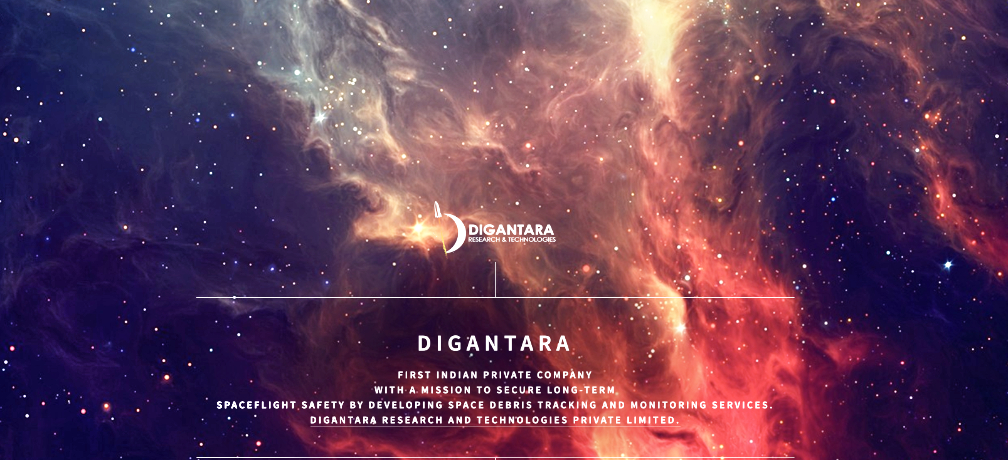
Space-tech startup Digantara has raised $2.5 million as part of their seed round of funding from Kalaari Capital — this funding will accelerate Digantara’s product development and enable them to launch their first satellite (technology demonstration mission) to LEO, sooner than expected.
Overall this will strengthen Digantara’s efforts in making space operations safer and increasing orbital sustainability. The startup is incubated by the Society for Innovation and Development (SID) at the Indian Institute of Science (IISc).
Digantara is set to take on the problem of space junk and eliminate the risk of collisions in space. Massive fleets of satellites in space are required to constantly maneuver to avoid not only one another but also potentially damaging space debris. This can only be done with greater oversight to collision avoidance instructions, for which Space Situational Awareness (SSA) is paramount. SSA also refers to keeping track of objects on-orbit and predicting where they will be at any given time. Digantara is India’s first startup to be working in this space and, globally, they are pioneers of the hybrid approach to debris tracking.
Existing SSA solutions are either ground-based or utilize passive sensors alone, limiting debris tracking in terms of range, accuracy, sensitivity, number of objects detected, and overall data. The team of space architects at Digantara is developing a unique patent-backed comprehensive SSA solution suite for modelling centimeter-sized Resident Space Objects (RSO) and space weather in LEO. They combine space weather data to their prediction models to enhance data accuracy further than current technology permits. This significantly helps reduce uncertainties in space where minor shifts in position can be catastrophic for satellites and space objects and cause damage worth millions of dollars.
The team recently managed to bring in Dr. Satyanarayana Malladi as Chief Scientific officer (CSO). Dr. Malladi is the Former Project Director, Space Borne Lidar at Vikram Sarabhai Space Centre, ISRO. Other recent wins include OneWeb’s 2021 Innovation Challenge, for which Digantara will work with OneWeb on an unspecified research and development project. A Grant of Rs. 50 Lakh was also awarded to Digantara for their win at ISRO ARISE ANIC – Category 3 — Space Robotics/VR/AR/Outer Space Monitoring.
Anirudh Sharma, CEO of Digantara, said, “In the dawn of the New Space Era, Space Safety and Sustainability is a major concern to the proliferated LEO Ecosystem. Just like the aviation sector, Space inevitably requires an efficient traffic management system. At Digantara, we are pioneering an active surveillance technology based in space to provide precise orbital insights to ensure continued safe space operations. It gives us an unparalleled advantage to enhance the quality of the data. We are elated to be supported by Kalaari Capital and to partner with Mr. Ravinder Singh and team, for expressing affirm confidence in Digantara and joining us in the journey of building a global space company. This funding will add more fuel to our spaceflight payload development and accelerate the launch of our first mission.”
Ravinder Pal Singh, Partner at Kalaari Capital, said, “Space Situational Awareness will be a critical component for the functioning of the Lower Earth Orbit Economy. As the New Space Economy grows, Digantara’s offerings not only help deal with space debris but will be the infrastructural enabler on which commercial missions to space and space-based services will be built. Digantara’s young founders’ passion, capability and sincerity of purpose to explore, discover and contribute to the journey of space and solve its ambiguities is inspirational.”
Digantara is India’s first start-up working on Space Surveillance and Space Situational Awareness (SSA). The multifarious team of space architects is developing a patent-backed comprehensive SSA solution suite for modelling centimetre-sized Resident Space Objects (RSO) and space weather in Low Earth Orbit. The founders Mr Anirudh N Sharma, Mr Rahul Rawat & Mr Tanveer Ahmed, being space enthusiasts, when confronted with inadequateness of spaceflight safety, conceptualized Digantara in 2018 to build a comprehensive SSA technology stack – all while pursuing bachelor’s degree at their university
